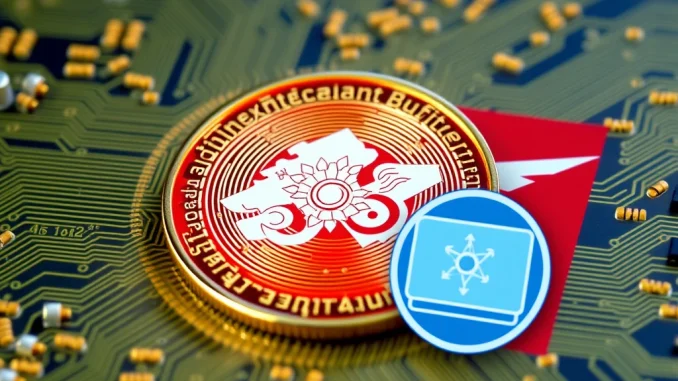
In a noteworthy development that has subtly rippled through the cryptocurrency sphere, the Royal Government of Bhutan has reportedly executed a significant Bitcoin transaction. Blockchain security watchdog PeckShieldAlert revealed on X (formerly Twitter) that a substantial 377.78 BTC, approximately valued at $32 million, was transferred to a newly designated wallet address. This clandestine movement of digital assets has sparked curiosity and speculation within the crypto community. What exactly does this Bitcoin wallet transfer signify, and why is Bhutan, a nation known for its Gross National Happiness index, making waves in the digital currency domain?
Decoding the Bhutan Bitcoin Transfer: What We Know
The specifics of this transaction, brought to light by PeckShieldAlert, are quite straightforward but carry layers of intrigue. Let’s break down what we know:
- The Transaction: A single transfer of 377.78 Bitcoin.
- Value: Roughly $32 million at the time of the transaction.
- Origin: From a wallet associated with the Royal Government of Bhutan.
- Destination: A new, previously unused wallet address.
- Source of Information: PeckShieldAlert, a reputable blockchain security firm known for tracking and reporting on cryptocurrency movements.
While the ‘what’ is clear, the ‘why’ and ‘what next’ remain shrouded in some mystery. This cryptocurrency transfer raises several pertinent questions.
Why is Bhutan Involved in Bitcoin? A Historical Perspective
Bhutan’s engagement with cryptocurrencies, particularly Bitcoin, is not entirely new. The nation has reportedly been involved in Bitcoin mining operations for several years. Driven by its abundant and inexpensive hydroelectric power, Bhutan saw an opportunity in the energy-intensive process of Bitcoin mining. Here’s a quick rundown of Bhutan’s crypto journey:
- Early Adoption: Bhutan reportedly started exploring Bitcoin mining as early as 2015.
- Energy Advantage: The country’s surplus hydroelectric power made Bitcoin mining economically viable.
- Strategic Diversification: Crypto mining could be seen as a part of Bhutan’s efforts to diversify its economy beyond tourism and hydropower.
- Sovereign Wealth Management: Accumulated Bitcoin could potentially be part of Bhutan’s sovereign wealth, managed for the nation’s future.
Given this background, the recent government crypto transfer might be interpreted in several ways. It could be a routine portfolio rebalancing, a security measure, or perhaps a strategic move in anticipation of future market trends.
Is This Just Portfolio Management or Something More Strategic?
Financial institutions and governments frequently move assets between wallets for various reasons. For Bhutan, this BTC move could be:
- Security Enhancement: Moving assets to a new wallet can be a security measure to protect against potential compromises of older wallets.
- Portfolio Rebalancing: It might be a part of regular portfolio management, consolidating or segregating assets.
- OTC Trading Preparation: Large transfers to new wallets sometimes precede over-the-counter (OTC) trading activities.
- Custodial Changes: Bhutan might be shifting custodians or using different cold storage solutions.
However, the lack of official communication from the Royal Government of Bhutan leaves room for speculation. In the opaque world of cryptocurrency transactions, interpretations can range from mundane to momentous. Could this be a signal of Bhutan’s increasing confidence in Bitcoin, or simply a prudent financial maneuver?
The Broader Implications for Government Crypto Adoption
Regardless of the specific reason behind Bhutan’s cryptocurrency transfer, it underscores a larger trend: the growing, albeit often discreet, involvement of nation-states in the crypto space. While El Salvador has famously adopted Bitcoin as legal tender, many other governments are exploring or quietly engaging with digital assets. Bhutan’s case highlights:
- Silent Accumulation: Governments might be accumulating Bitcoin without public fanfare, recognizing its potential as a store of value.
- Strategic Reserves: Bitcoin could become a part of national strategic reserves, diversifying away from traditional assets.
- Geopolitical Implications: Nations holding Bitcoin might gain a new dimension in international finance and geopolitics.
- Technological Experimentation: Governments are likely experimenting with blockchain technology and digital currencies for various applications beyond just finance.
Bhutan’s move, though seemingly under the radar, adds to the narrative of institutional and governmental interest in Bitcoin. It suggests that sovereign entities are not just observing the crypto market from the sidelines but are actively participating, albeit discreetly.
Challenges and Considerations for Nations Holding Bitcoin
While holding Bitcoin can present opportunities, it also comes with challenges for governments:
| Challenge | Description |
|---|---|
| Volatility: | Bitcoin’s price volatility poses a significant risk to national reserves. |
| Regulatory Uncertainty: | The evolving and often unclear regulatory landscape for cryptocurrencies globally. |
| Security Risks: | Safeguarding large Bitcoin holdings from hacking and theft requires robust security infrastructure. |
| Transparency Concerns: | Lack of transparency in crypto transactions can raise accountability issues for governments. |
| Public Perception: | Public and political opinion on cryptocurrency can be divided and potentially critical. |
For Bhutan, navigating these challenges will be crucial as it continues its crypto journey. Balancing the potential benefits of Bitcoin with the inherent risks requires careful planning and strategic execution.
Actionable Insights: What Can We Learn From Bhutan’s Move?
For individuals and institutions interested in cryptocurrency, Bhutan’s Bitcoin transfer offers several key takeaways:
- Government Interest is Real: Nations are engaging with crypto, even if quietly. Pay attention to these subtle signals.
- Strategic Thinking: Consider the strategic rationale behind large crypto movements. It’s not always just about speculation.
- Security Matters: Wallet management and security are paramount, especially for large holdings.
- Long-Term Vision: Bhutan’s long-term involvement suggests a belief in the enduring value of Bitcoin and potentially blockchain technology.
- Diversification is Key: For nations and individuals alike, crypto can be part of a diversified portfolio.
Conclusion: A Strategic Whisper in the Crypto Wind
The Royal Government of Bhutan’s $32 million Bitcoin wallet transfer, while not earth-shattering in itself, is a significant whisper in the crypto wind. It reinforces the narrative of quiet, strategic accumulation and engagement by sovereign entities. As the world continues to grapple with the implications of digital currencies, Bhutan’s subtle moves offer a glimpse into the evolving landscape of nation-state crypto adoption. Whether this is a mere portfolio shuffle or a harbinger of bolder crypto strategies from Bhutan, the crypto community will be watching with keen interest. This strategic shift highlights that the crypto revolution is not just a retail phenomenon; it’s quietly becoming a part of the global financial and geopolitical chessboard.



